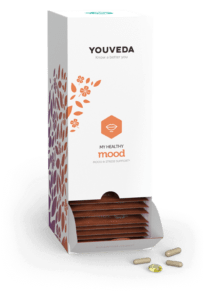Tell me if this sounds familiar: You’re sitting down and realize you need to get something in the other room. You get up, walk halfway to the other room, then stop dead in your tracks, “what was I going to get?” How you can beat brain fog – Vitamin Supplements, exercise, other solutions can provide the answer
It happens to all of us from time-to-time, but if you find yourself forgetting often, having a hard time concentrating or feeling just plain fuzzy, you might be suffering from brain fog.
While it might seem easy to blame these occurrences on our fast-paced culture, with the average attention span now reported to be just a mere 8 seconds, brain fog is a real condition that can wreak havoc on your life if left unchecked.
What Are the Signs of Brain Fog?

Brain fog can be different for everyone, but it’s often described as feeling fuzzy or “in a funk.” Brain fog is the opposite of a healthy, calm and level-headed mind. Perpetual brain fog can leave you feeling unmotivated, increase the chances of depressive symptoms and can raise anxiety levels.
Symptoms include:
- Trouble concentrating
- Trouble remembering information
- Easily irritable
- Difficulty finding the right word
- Confusion
- Struggle to learn new things
- Forgetfulness
- Headaches
- Insomnia
- Trouble staying asleep
- Increased anxiety
- Low motivation
- Depression
What Causes Brain Fog?
One of the top causes of brain fog comes from lack of quality sleep. If you are feeling foggy, make sure you are getting 7-9 hours of sleep every night. Making sure to get enough recovery time between hard workouts and scheduling some regular downtime are also important elements of allowing your mind and body enough rest to function properly.
If you are getting consistent and quality sleep and still having trouble focusing, it could be due to a hormonal imbalance. Changes to the hormones serotonin, dopamine and cortisol can throw your whole system off, inducing feelings of fuzziness.
Causes of hormonal imbalances can come from pregnancy, some medications, menopause, adrenal fatigue, thyroid problems, and stress. Stress can make a huge impact on hormones, particularly cortisol, and can cause many unwanted symptoms including brain fog, fatigue, weak digestion, and premature aging.
Another common culprit when it comes to brain fog is inflammation. This should be no surprise as inflammation is the root of all disease and disorder in the body. Inflammation can come from many different sources including candida overgrowth, leaky gut syndrome, histamine intolerances and a big culprit for many is inflammatory foods or diets high in refined sugar. Gluten and casein (milk protein) can be troublesome for some individuals as well.
3 Steps to Treat Brain Fog

Diet – Check your sugar addiction. Refined sugar, artificial sweeteners and processed foods might make you feel energetic at first, but will quickly make your mind and body crash, ultimately leading to a vicious cycle of sugar addiction and brain fog.
Focus your diet on natural sugars from fruit and quality carbs from vegetables. These foods actually help keep your serotonin levels even and help contribute to feeling calm and focused. If you are watching your carb intake, make sure you aren’t cutting too many quality carbs from your diet as this will negatively affect your hormonal levels.
Limiting sugar and focusing on fruits and vegetables will have the added benefit of reducing possible inflammation in the body. If you aren’t sure about specific food intolerances you might have, following an elimination diet will help give you invaluable information about how specific foods affect your body and how they make you feel, empowering you to make the right choices for your body down the road.
Stress and Sleep – Making concerted efforts to manage your stress levels and improve the quality of your sleep will help you fight brain fog.
Chronic stress will lead to high amounts of cortisol production that can make your hormones go haywire. Practice stress reducing techniques like meditation, journaling, going for a walk, spending time in nature or reading a great book.
Concentrating on making sure your dopamine levels are high will have additional stress-reducing benefits. Dopamine is the hormone that makes us feel pleasure and happiness. Focus some of your time on activities that you enjoy, learning something new, laughing out loud or spending time with people you love.
If you know you aren’t sleeping well at night, make efforts to improve the quality of your sleep naturally. Try to get into bed an hour earlier, turn off all electronic screens about one hour before bed time, take a warm bath and drink golden milk before turning in for the night.
Supplements – Using supplements can be a great way to get yourself back on track when it comes to fighting the fog.
Adaptogens like ashwagandha can help the body better adapt to stress and will help lower the amounts of cortisol your body produces. Ashwagandha can also help promote feelings of calm and reduce symptoms of anxiety.
Fish Oils and Omega 3s help lower inflammation in the body and support healthy brain function. 750mg are found in YouVeda My Healthy Moodalong with 500mg of EPA and 250mg of DHA to provide full brain support.
B vitamins help convert the nutrients from food into fuel for the body, and deficiencies in these essential vitamins can lead to symptoms of brain fog. YouVeda My Healthy Mood contains sea buckthorn which is a great source of B vitamins, amino acids, and antioxidants.





